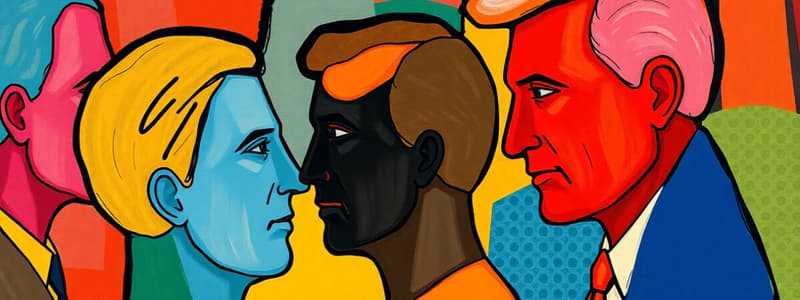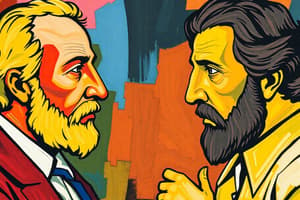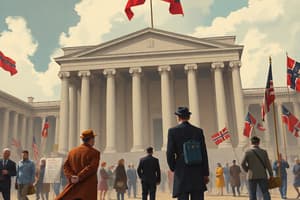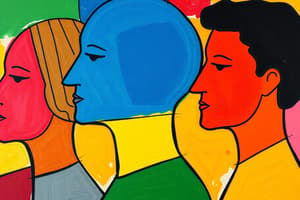Podcast
Questions and Answers
What influences a citizen's political ideology according to the concept of political socialization?
What influences a citizen's political ideology according to the concept of political socialization?
- Personal experiences in isolation
- Economic status only
- Government policies only
- Family, school, peers, media, and social environments (correct)
Which of the following core values do citizens have different interpretations of?
Which of the following core values do citizens have different interpretations of?
- Totalitarian governance
- State control of the economy
- Monopolistic capitalism
- Equality of opportunity (correct)
What is a primary outcome of differing individual attitudes toward government among citizens?
What is a primary outcome of differing individual attitudes toward government among citizens?
- Uniformity in political party support
- A lack of government engagement
- Complete consensus on policy issues
- Support for a variety of political parties and ideologies (correct)
How has globalization impacted US political culture?
How has globalization impacted US political culture?
Which aspect does NOT typically shape an individual's political ideology?
Which aspect does NOT typically shape an individual's political ideology?
What characteristic is most important for ensuring the accuracy of a poll?
What characteristic is most important for ensuring the accuracy of a poll?
Which political ideology generally supports more government regulation of the marketplace?
Which political ideology generally supports more government regulation of the marketplace?
Which fiscal policy approach suggests that increasing government spending is essential when demand is too low?
Which fiscal policy approach suggests that increasing government spending is essential when demand is too low?
Which of the following statements correctly describes the role of the Federal Reserve?
Which of the following statements correctly describes the role of the Federal Reserve?
What type of spending includes programs like Medicare and Social Security?
What type of spending includes programs like Medicare and Social Security?
Which ideology typically advocates for less national government influence in social issues?
Which ideology typically advocates for less national government influence in social issues?
What do populists typically believe regarding economic and social issues?
What do populists typically believe regarding economic and social issues?
What is a defining feature of a progressive tax system?
What is a defining feature of a progressive tax system?
Which term reflects how relevant an issue is to the participant in a poll?
Which term reflects how relevant an issue is to the participant in a poll?
What is the largest entitlement program in the United States?
What is the largest entitlement program in the United States?
Which of the following best describes fund allocation in fiscal policy?
Which of the following best describes fund allocation in fiscal policy?
What approach do libertarians generally take regarding marketplace regulation?
What approach do libertarians generally take regarding marketplace regulation?
In what manner are interest groups often perceived due to their influence on policy making?
In what manner are interest groups often perceived due to their influence on policy making?
Which statement accurately reflects the political identification of children in relation to their parents?
Which statement accurately reflects the political identification of children in relation to their parents?
What does the gender gap in politics illustrate?
What does the gender gap in politics illustrate?
Which racial or ethnic group is noted for being overwhelmingly Democratic in political affiliation?
Which racial or ethnic group is noted for being overwhelmingly Democratic in political affiliation?
How have men's political affiliations changed since the 1960s?
How have men's political affiliations changed since the 1960s?
Which group is recognized as the largest untapped voting block in the United States?
Which group is recognized as the largest untapped voting block in the United States?
What factor most strongly characterizes the voting behavior of Southern white Protestants?
What factor most strongly characterizes the voting behavior of Southern white Protestants?
What is a characteristic feature of public opinion?
What is a characteristic feature of public opinion?
Which type of poll is designed to track changes in voters' opinions throughout a campaign?
Which type of poll is designed to track changes in voters' opinions throughout a campaign?
What is a common misconception about political party identification in families?
What is a common misconception about political party identification in families?
What contributes to the differences in political opinions between genders?
What contributes to the differences in political opinions between genders?
Flashcards
Political Socialization
Political Socialization
The process of developing political beliefs, values, opinions, and behaviors.
US Political Culture
US Political Culture
The shared values, beliefs, and attitudes about government and politics in the US.
Political Beliefs
Political Beliefs
Individual opinions and attitudes about the role of government and policies.
Individualism
Individualism
Signup and view all the flashcards
Political Ideologies
Political Ideologies
Signup and view all the flashcards
Political Ideology Influence
Political Ideology Influence
Signup and view all the flashcards
Family's Role in Politics
Family's Role in Politics
Signup and view all the flashcards
Gender Gap (Politics)
Gender Gap (Politics)
Signup and view all the flashcards
Republican/Democrat Trends
Republican/Democrat Trends
Signup and view all the flashcards
Race's Political Influence
Race's Political Influence
Signup and view all the flashcards
Religion and Politics
Religion and Politics
Signup and view all the flashcards
Regional Political Differences
Regional Political Differences
Signup and view all the flashcards
Public Opinion and Types of Polls
Public Opinion and Types of Polls
Signup and view all the flashcards
Characteristics of a Good Poll
Characteristics of a Good Poll
Signup and view all the flashcards
Voter Political Independence
Voter Political Independence
Signup and view all the flashcards
Random Sample
Random Sample
Signup and view all the flashcards
Large Sample Size
Large Sample Size
Signup and view all the flashcards
Margin of Error
Margin of Error
Signup and view all the flashcards
Specific and Unbiased Wording
Specific and Unbiased Wording
Signup and view all the flashcards
Accurate Reporting
Accurate Reporting
Signup and view all the flashcards
Saliency
Saliency
Signup and view all the flashcards
Intensity
Intensity
Signup and view all the flashcards
Stability
Stability
Signup and view all the flashcards
Liberal Ideology
Liberal Ideology
Signup and view all the flashcards
Conservative Ideology
Conservative Ideology
Signup and view all the flashcards
Libertarian Ideology
Libertarian Ideology
Signup and view all the flashcards
Fiscal Policy
Fiscal Policy
Signup and view all the flashcards
Keynesian Economics
Keynesian Economics
Signup and view all the flashcards
Supply-Side Theory
Supply-Side Theory
Signup and view all the flashcards
Monetary Policy
Monetary Policy
Signup and view all the flashcards
Study Notes
American Political Ideologies and Beliefs
- Different interpretations of core values influence the relationship between citizens and the federal government, as well as between citizens.
- Citizens hold varying views on individualism, equality of opportunity, free enterprise, and the rule of law.
- These individual attitudes result in support for diverse political parties, ideologies, and policy stances.
- Political Socialization refers to the development of an individual's political beliefs, values, opinions, and behaviors through factors such as family, school, peers, media, and social environments.
US Political Culture
- US political culture is defined by its democratic ideals, principles, and core values.
- This culture has been influenced by and in turn influenced other countries due to globalization.
- An individual's ideology is shaped by culture, age, and experiences.
- Major political events can also shape individual political attitudes and ideologies.
Role of the Family
- Family's party identification is often adopted initially, but individuals develop independent thought over time.
- Younger voters tend to be more independent and often lean more Democratic than Republican.
- Political ideologies are rarely passed down from family to family.
The Gender Gap
- The gender gap in political opinions exists between men and women.
- Historically, women followed their husband's political ideologies, creating a different view point compared to men.
- Significant differences in political issues exist between today's male and female voters, with women supporting the Democratic party more often.
Race and Ethnicity
- Black and Hispanic individuals tend to hold more liberal views than other groups of Americans.
- They commonly support liberal social programs.
- African Americans are a consistently Democratic voting bloc, while Cubans are often Republican.
- Hispanics are a sizable and somewhat underutilized voting block.
What is Public Opinion?
- Public opinion is the collective view of a group of people on various issues.
- This opinion is influenced by various factors and types if polls, including opinion polls, benchmark polls, tracking polls, and exit polls.
- Essential characteristics of effective polls include a representative sample of participants, a large sample size, properly worded questions, and reasonable margins of error to increase accuracy.
Ideologies and Policy Making
- The Democratic party's platform commonly aligns with liberal ideologies, while the Republican Party's platform aligns more with conservative ideology.
- Public policies reflect the attitudes and beliefs of citizens who engage politically.
- Ideologies and beliefs regarding economic policies vary considerably, with liberals favoring more government regulation and conservatives advocating for less.
Fiscal Policy
- Fiscal Policy involves the government collecting taxes and determining how to allocate the funds.
- Keynesian economics emphasizes government spending to stimulate economic conditions and address periods of low demand.
- Supply-side theory concentrates on minimizing government intervention to maximize individual spending and market forces.
Monetary Policy
- Monetary policy involves actions by the Federal Reserve to influence interest rates, which affects economic conditions.
- The Federal Reserve influences maximum employment and price stability by monitoring economic conditions and regulating the money supply and interest rates.
Social Security
- Social security is a large entitlement program that provides financial assistance to retirees, the unemployed and the disabled.
Medicare/Medicaid
- Medicare is a program that eases the cost of healthcare for individuals over 65.
- Medicaid offers healthcare to low-income Americans.
Ideology and Social Policy
- Liberals generally advocate for increased national government involvement in social issues, including healthcare and education, while conservatives prefer less government involvement.
- Libertarians favor minimal government intervention, except for the protection of individual liberty.
Political Elite
- Political elites are individuals who possess greater knowledge and greater engagement and participation in political life; and who hold disproportionate influence over political decisions than the average citizen in a democracy.
Policy Making in the US
- Policy making involves a multifaceted process, including identifying issues, developing policy options, conducting cost-benefit analyses, and gaining public support.
- The US political system features mechanisms such as interest groups, legislators and administrative agencies making significant contributions to the process.
Taxation
- The 16th Amendment authorizes the US Congress to levy an income tax.
- The Internal Revenue Service (IRS) is the agency responsible for tax collection.
- The US tax system employs a progressive structure, with higher incomes subject to higher tax rates.
Studying That Suits You
Use AI to generate personalized quizzes and flashcards to suit your learning preferences.
Related Documents
Description
Explore the varying interpretations of core values that shape the relationship between citizens and the federal government. This quiz delves into concepts such as political socialization, individualism, and the influence of political culture on ideology. Test your understanding of how these factors impact political beliefs and behaviors.




